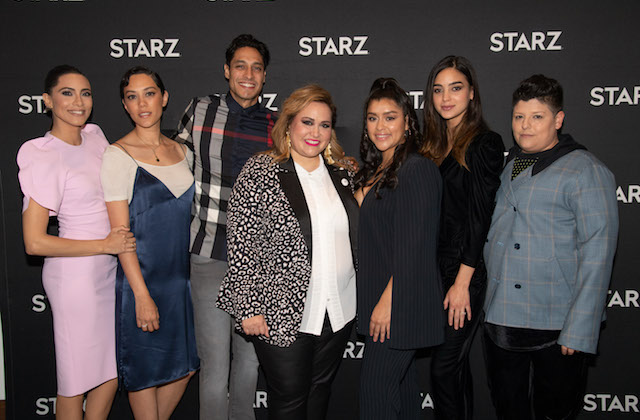When Starz offered playwright Tanya Saracho the chance to create a new series based on Latinx millennial women, she made sure to fill her writers’ room entirely with Latinx people. That show, "Vida," premieres on Starz this Sunday (May 6) at 7:30 p.m.
"Vida" follows two Latinx sisters, Emma (Mishel Prada, "Tell Me How I Die") and Lyn (Melissa Barrera, "Tanto Amor"), as they return to their East Los Angeles home following their mother’s death. Emma, who identifies as gay, wrestles with the revelation that her mother was in a relationship with Eddy (played by non-binary thespian Ser Anzoategui, who the Village Voice noted uses they/them pronouns in real life while Eddy primarily uses she/her). Emma and Lyn’s shock is compounded by the status of their family’s bar and the immigrants of undocumented status who rent rooms upstairs. All of the main characters must confront hard truths as they, caught between money-hungry developers and community activists who critique the gentrifying "chipsters" (a portmanteau of "Chicana" and "hipster"), figure out what to do with the bar.
Saracho and writers Evangeline Ordaz ("Seven Seconds"), Mando Alvarado ("Tyrant") Chelsey Lora ("Greenleaf"), Santa Sierra ("Narcos"), Nancy Mejía ("Mateo") and Jenniffer Castillo ("Power") collectively constitute the first documented all-Latinx writers’ room for any Hollywood series. The septet spoke to Vulture yesterday (May 3) about the series’ creation, themes and depictions of Latinx complexity. Here are a few choice excerpts from their roundtable conversation:
Saracho on facing backlash from other writers about making her room entirely Latinx:
rnt"They were like, ‘Why would you wanna do that to yourself? Just staff the best people.’ And I always thought, I will be staffing the best people. The best people for this job are the best writers who happen to be Latinx. For this particular job. Maybe not other shows I do. I do think when you see those first six episodes, you get that intimacy you couldn’t have. Everyone has cultural shorthand in this room. It happened too with the directors and the cinematographers."
Castillo on relating to the show’s LGBTQ characters:
rnt"The thing I relate to the most is definitely the queer Latinx women [who] are in the show. The whole Emma story, as well, with her mother. I know what it’s like to be rejected by your own mother because of your queer identity. My relationship with my mother will never be the same because she does not accept me and my partner. They did not attend my wedding. So I’m in that place where Emma was before her mother passes away, potentially one day able to forgive her mother. We had a bruja come in, Sabrina. … She said, ‘I’m taking the weight of people that you’re carrying. I’m feeling your mother.’ As soon as she said that, she goes, ‘Is your mother still alive?’ And I just burst into tears. I didn’t realize I was holding onto that. But I know that, to my mother, in a way I died when I came out to her. And to me, my mother died when she decided not to go to my wedding. [Tears up.] So there’s totally that."
Sierra on Latinx TV characters with accents as punchlines:
rnt"The accent is a little bit like Blackface. You see it with ‘Modern Family.’ I love that show. I think it’s a brilliant comedy. But, again, having an accent doesn’t necessarily have to be paired with having less intelligence. That affected me because I had an accent when I was in school and people automatically thought I was dumber because of it."
Ordaz on being the "diversity hire" on a previous show:
rnt"In my case, the showrunner did try and make me feel like everybody else. Everybody had an office. I had an office. But it did the same thing to me, like when I got to law school and it was, ‘Oh, you’re only here because you’re Latina.’ … It was really terrible. And there was one Latino director hired that year, and, and he was treated horribly. Horribly. This is a Latino director with 30 years of experience, and he was treated like he didn’t know what he was doing. Then I realized, ‘Oh! They’re treating me the same way!’ [Laughs.] That show literally decimated my confidence that I could be a TV writer. I decided not to pursue TV writing for several years."
Alvarado on colorism as an experience uniting various Latinx groups:
rnt"You can tell a story of colorism. Colorism exists in all our cultures. ‘El blanquito.’ ‘El negrito.’ If you tell that story then we’re all, ‘Yeah, I connect to that.’"
